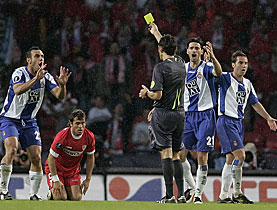
Players warned to behave during Euro 2008

Referees will be cracking down on dangerous tackles, serious dissent and players who dive during the Euro 2008 championships in June.
European football’s governing body, Uefa, said officials would protect the game’s image at the tournament, co-hosted by Switzerland and Austria. Film footage could also be used to punish players retrospectively.
The announcement was made at the end of a preparatory workshop for referees and their assistants in Regensdorf, near Zurich, on Thursday.
Officials were told to issue the red card for challenges that used “excessive force which thereby endanger the safety of the opponent”.
“We want the star players to end the tournament in the same condition as they started,” said Hugh Dallas of Uefa’s refereeing commission.
Players can also expect cautions for jostling in the penalty area before corner kicks, arguing with officials, running the length of the pitch to get involved in confrontations and falling down unfairly to win a free-kick or penalty – known as simulation.
Uefa’s disciplinary panel could use video evidence to later punish a player guilty of simulation if it is not spotted by officials during the match.
The tough stance follows criticism in many countries that an increasing numbers of players were resorting to underhand tactics to win games. The 2006 World Cup final was overshadowed by star French player Zinedine Zidane’s “chest butt” on Italian Marco Materazzi.
Behaviour improving
But English referee Howard Webb, who will officiate during Euro 2008, told swissinfo that such problems are coming under control.
“Simulation, dissent and confrontation are a slur on the game that needs to be cut out.
We had a rise five or six years ago, but I don’t think it’s got worse in the last few seasons. I think the message is getting through to players that the game needs protecting,” he said.
“Some people are turned off football because of some behaviour they see on the field. Players have a role to play by ensuring that their behaviour doesn’t drop below a required standard.”
Each of the 16 teams taking part in the tournament will be invited to the referee’s base in Regensdorf to receive clarification of Uefa’s stance.
All 12 referees, from different countries, plus their two assistants took part in a four-day preparatory workshop to test their fitness and receive technical instructions on how to officiate the championships.
17th team
The officials were chosen by Uefa based on their performance both in domestic and European matches. Uefa Referee’s Commission chairman Angel María Villar Llona referred to them as the “17th team” of the tournament.
“I am convinced that this will be an excellent tournament because it will have the best refereeing of all time,” he said.
Swiss referee Massimo Busacca said he felt even more pride at representing his country at Euro 2008 than during the 2006 World Cup.
“It is an honour to be the Swiss referee in this big tournament in Switzerland. I know there will be more pressure on me, but I have already experienced a big tournament in Germany, so I can use this to be ready and fully prepared in June,” he told swissinfo.
swissinfo, Matthew Allen in Regensdorf
Twelve teams of officials, consisting of one referee and two assistants (linesmen), were chosen from Switzerland, Austria, Belgium, England, Germany, Greece, Italy, the Netherlands, Norway, Slovakia, Spain and Sweden.
Massimo Busacca will again be Switzerland’s representative after officiating in the 2006 World Cup in Germany. His assistants are Matthias Arnet and Stéphane Cuhat.
The officiating team will be completed by eight fourth officials, who will act as substitute referees. Five officials will be present at each match, with one linesman not officiating standing by as cover for an injured assistant referee.
Referees will be paid €10,000 (SFr16,000) per match, assistants €5,000, fourth officials €4,000 and reserve assistants €3,000.
Switzerland will co-host the Euro 2008 football tournament with Austria from June 7-29.
The 31 games will be played in four cities in Switzerland (Basel, Bern, Geneva and Zurich) and four cities in Austria (Innsbruck, Klagenfurt, Salzburg and Vienna).

In compliance with the JTI standards
More: SWI swissinfo.ch certified by the Journalism Trust Initiative





























You can find an overview of ongoing debates with our journalists here . Please join us!
If you want to start a conversation about a topic raised in this article or want to report factual errors, email us at english@swissinfo.ch.